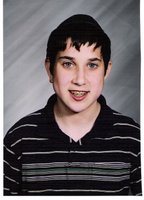Avi's bronze synagogue memorial plaque finally came in last Friday, after months of unreasonable delay. As I had expected, my order was not filled to my specifications. I had wanted not the civil date of Avi's death, which has no Jewish significance (the Hebrew date is what's important), but rather his lifespan, 1990-2006. I want anyone who views the plaque in future decades to know that it was not memorializing a "routine" death, i.e., in old age.
Rabbi Adler had the plaque mounted Sunday morning on the memorial board just outside the daily chapel, where most Friday and Saturday afternoon and weekday services ("minyans") are held.
This is the board that a worshiper passes by when he first enters the building through the "minyan" entrance. This is the board that Avi himself passed by on so many occasions as a regular minyan attendee. That board was not meant to have his name on it.
I viewed Avi's mounted plaque for the first time Sunday afternoon, just before the early, pre-Yom Kippur Mincha (afternoon) service. After services, I just stared at it after most of the other congregants had left.
I returned home for our special, pre-Yom Kippur fast meal. Susie told me that she had begun to take out five soup bowls before realizing that we had become a family of only four.
As for Yom Kippur itself, I went through the motions. I did stay for most of the serices, including Unetane Tokef, but I was for the most part disengaged. I occupied myself more with my duties as ritual chairman, rather than with my duties to pray. I used Avi's beloved interlinear Mahzor (Yom Kippur prayerbook), but the traditional words asking for forgiveness from God and for sealing in the "Book of Life" simply went past me. I needed Avi's forgiveness more than atonement from God, but only the living can genuinely forgive.
As is customary, I wore my
kittel - the traditional white garment - for Yom Kippur. Avi lies lifeless in a similar garment.
Rabbi Adler on Yom Kippur day commented on the traditional Torah reading from Leviticus 16, which begins, "And it came to pass after the death of Aaron's two sons..." He certainly had me in mind when he asked why the brief mention of the sons' deaths should introduce the laws of the Biblical atonement rituals. He answered that God's Voice can be difficult for one to hear in the aftermath of the death of a child. Yet, it's precisely at that time that one is in most need of hearing that Voice and in attending to the Commandments.
The end of Yom Kippur starts the preparations of Sukkot. Avi always helped me to erect the family sukkah. This year, I'll do what I have to do to get through another Jewish festival, for which Jews are commanded, "You shall be joyous." Yes, I have to be commanded, because I won't be naturally joyous.


